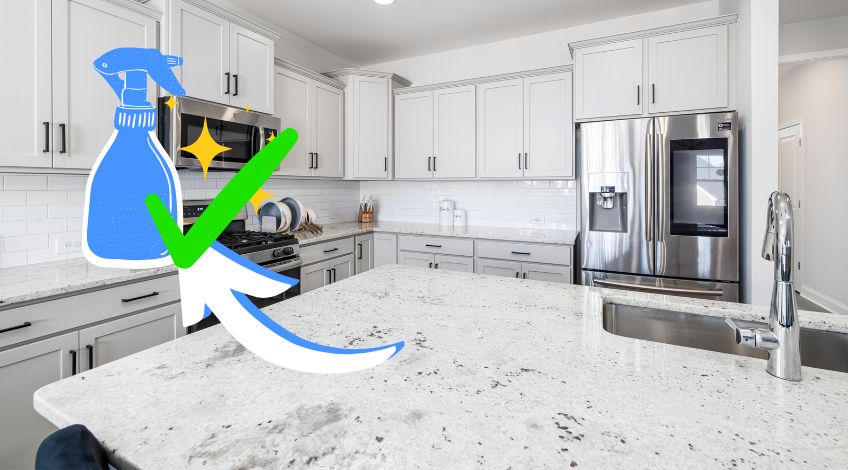
Stop Damaging Your Granite! The Right Way to Keep Countertops Spotless & Shiny
Granite countertops are a beautiful centrepiece in any kitchen, but if you’re cleaning them the wrong way, you might be causing more harm than good.
Scratches, dull patches, and stained spots often come down to everyday mistakes that are easily avoidable. With the right approach, you can keep your worktops gleaming without compromising the stone’s surface.
Here’s what you need to know to avoid damaging your granite while keeping it clean and polished.
Why Your Cleaning Habits Might Be Harming Granite
Granite may look tough, but it’s surprisingly vulnerable to the wrong cleaning products. Acidic substances like vinegar or lemon juice, and harsh cleaners like bleach or ammonia, can weaken the surface.
Over time, these products cause dullness and tiny pits known as etching. Even those common multi surface sprays can do more harm than good if they are not pH balanced for natural stone.
Abrasive pads are another culprit, especially when trying to scrub away dried on mess. The damage is not always immediate, but it builds up with every clean.
The Safest Way to Clean Granite (Without Losing the Shine)

For everyday cleaning, mild dish soap and warm water are usually all you need.
Just add a drop or two of soap to a spray bottle filled with water and shake gently. Spray over the surface and wipe with a soft, lint free cloth.
If you want an extra boost to cut grease and kill bacteria, add a splash of isopropyl alcohol. Use a ratio of three parts water to one part alcohol.
Avoid paper towels, as they can leave behind lint or tiny scratches. Stick to microfibre cloths or soft reusable cloths designed for delicate surfaces.
Common Granite Mistakes to Avoid
Some of the biggest mistakes happen without a second thought. Cutting fruit directly on granite might feel convenient, but it risks both knife damage and acid etching.
The same goes for placing hot pans straight from the hob or oven. This can lead to thermal shock, which may cause cracks.
Always use cutting boards and trivets to protect the surface. And do not leave spills to sit, especially if they are oily or acidic.
Wipe them up straight away with a damp cloth to avoid discolouration.
When to Use a Granite Sealer and Why It Matters
Granite may be naturally dense, but many types are still porous enough to soak in liquids, especially if unsealed. A quality stone sealer acts as a barrier to prevent stains from oils, sauces, or water.
If you’re unsure whether your granite needs sealing, sprinkle a few drops of water onto the surface. If they soak in within minutes, it’s time to reseal.
Most countertops benefit from sealing once or twice a year. Make sure the surface is completely dry and clean before applying any sealant to ensure proper bonding.
How Often Should You Be Cleaning Granite?

You do not need to scrub granite daily, but a gentle wipe down once a day or after heavy use helps maintain its appearance.
A deeper clean once a week using a stone safe cleaner or your homemade solution is enough to prevent grime build up. Resealing is less frequent but just as vital.
Regular care keeps bacteria at bay and protects the natural lustre of the stone, saving you money in the long run by avoiding repairs or early replacement.
Let Others Know the Right Way to Clean Granite!
These simple cleaning tricks are ideal for anyone wanting to protect their granite worktops and keep them looking their best. Post them on social media to show others how to maintain a spotless, damage free surface with ease!
SEE ALSO: 15 Must-Try DIY Cleaning Products You Can Make at Home
Also, follow us on Pinterest ...
